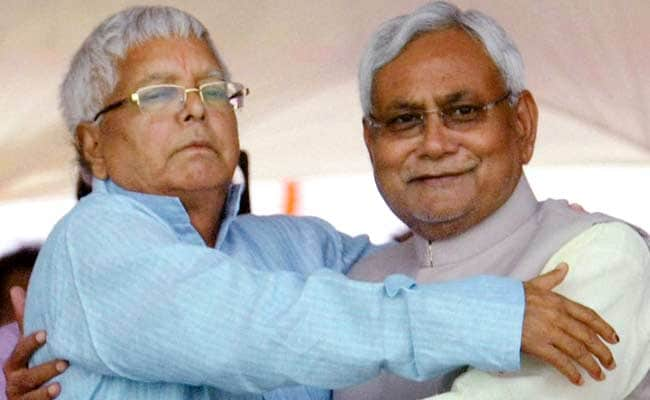Five years after they uncoupled in 2017, Lalu Yadav and Nitish Kumar, old socialist mates have joined hands again to form the next government in Bihar. They go back a long way. Both are products of the Lohia school of politics, cut their teeth in the "JP movement". Together, they brought about a seismic shift in the politics of Bihar and, in the process, turned the established caste calculus on its head.
They have been comrades and adversaries, said the most terrible things about each other, have won and lost electoral battles against and with each other. But for now, they have decided to thwart the BJP. It's an audacious gamble which offers a sliver of hope to the desperate Opposition. It is a significant development in as so far as it marks a breach in the seemingly impregnable hold that the BJP has come enjoy in the Hindi heartland.

Lalu Prasad Yadav and Nitish Kumar (File photo)
Nitish Kumar's decision to jettison the BJP, swallow his pride and make up with his old friend is not an overnight decision. It has been in the works for months. The JD(U) chief has been smarting ever since the last assembly election in Bihar, which saw his party reduced to the number three position. Though the BJP allowed him to continue as the Chief Minister, he is convinced that it used the LJP's Chirag Paswan to undercut him. A deeply suspicious man by nature, he sensed the BJP was trying to split his party by propping up his party colleague RCP Singh against him. Following Amit Shah's insistence on having Singh as the JD(U)'s nominee in the Union Cabinet, Nitish Kumar convinced himself that he needed to act before the BJP does to him what it did to Uddhav Thackeray in Bihar.
Unlike Lalu Yadav, the JD(U) chief is not known to shoot off his mouth, he prefers to keep his own counsel. But once he makes up his mind, he goes about achieving whatever he sets out to do, with cold-blooded single mindedness. Without much fanfare or noise, he set about mending fences with the RJD. He reached out to Lalu Yadav and thereafter, Tejashwi Yadav. The RJD, smarting from his decision to ditch it for the BJP in 2017, took a lot of persuading. Tejashwi was reluctant but eventually came around. Infact, not long after he broke from the RJD in 2017, Nitish Kumar had indicated a willingness to retrace his steps, but Tejashwi Yadav, hurting from the events of the recent past, had vehemently opposed it. This time around, the Chief Minister sought to create a common platform for the two parties to work together by insisting on a caste census in the state despite the fact that the Modi government had ruled out a similar move at the Centre.

Nitish Kumar and Tejashwi Yadav
Subsequently, the two sides began moving closer. Personal attacks became a thing of the past with both the Chief Minister and Tejashwai Yadav displayed a great deal of bonhomie towards each other at their respective Iftar parties. The Chief Minister personally ensured that all arrangements were in place to airlift a badly-injured Lalu Yadav to Delhi when he was sick. He also began slowly distancing himself from the BJP. He skipped attending the Niti Ayog conference earlier this week, in addition to abstaining from new President's swearing-in ceremony.
Nitish Kumar and Lalu Yadav, two self-confessed Lohiaites, are very unlike each other. The RJD chief is easily the more charismatic of the two. In his prime, he was flamboyant, in-your-face. Could work the crowds like few others did. He was the face of the social justice movement. He ruled Bihar for 15 long years and was once its great hope. Nitish Kumar, in contrast, was sober and circumspect. An engineer by training. Methodical and disciplined, in sharp contrast to the RJD chief. Seen as clean, despite his partner-swapping.

PM Modi and Nitish Kumar (File photo)
The two were a team in the 1980s when Nitish Kumar worked tirelessly to ensure that Lalu Yadav became Chief Minister of Bihar in 1989, almost out of nowhere. But cracks developed and the two began to drift apart, finally parting ways in 1994, with Nitish Kumar stepping out of the JD to form the Samata Party along with Gerge Fernandes. In 1996, he joined hands with the BJP, went onto to become a union minister in the Atal Behari Vajpayee-led government at the centre. Nitish Kumar broke up with the NDA in 2013 following differences on Narendra Modi and teamed up with the RJD and the Congress to win the next assembly elections in Bihar. That alliance was short-lived and he teamed up once again with the BJP in 2017.
For now, the seven-party new alliance appears to be on safe ground. With the Congress and the Left and other smaller regional parties, the numbers are hugely in its favor. After his exit from the NDA in 2013, Nitish Kumar was being spoken of as the Opposition's face against Modi. His break with the BJP could lead to similar conjecture again. But given his flip-flops, his reliability is seen as deeply questionable. He may have won over Lalu and Tejashwi Yadav, but he will now have to convince people that his new team is for keeps.
(The writer is a senior journalist and political analyst.)
Disclaimer: These are the personal opinions of the author.


